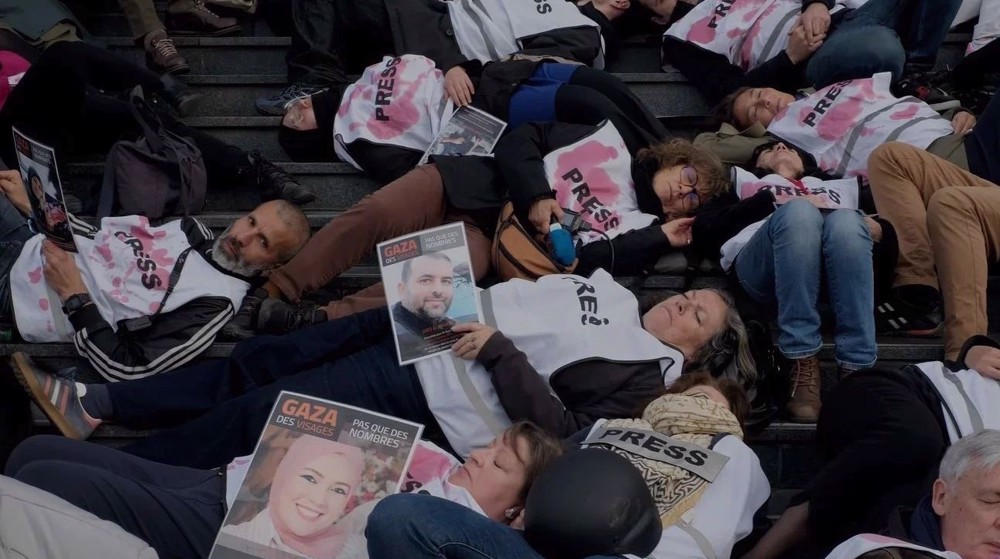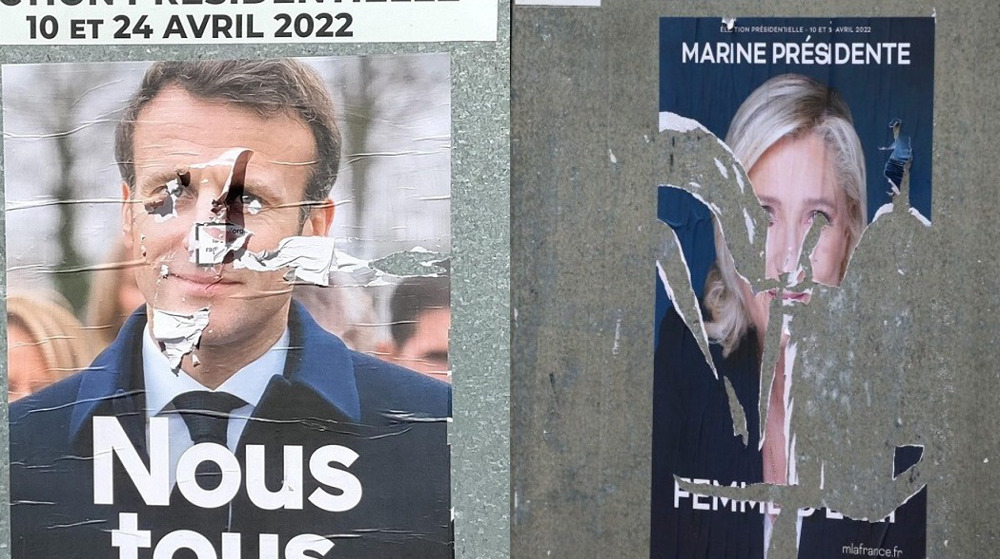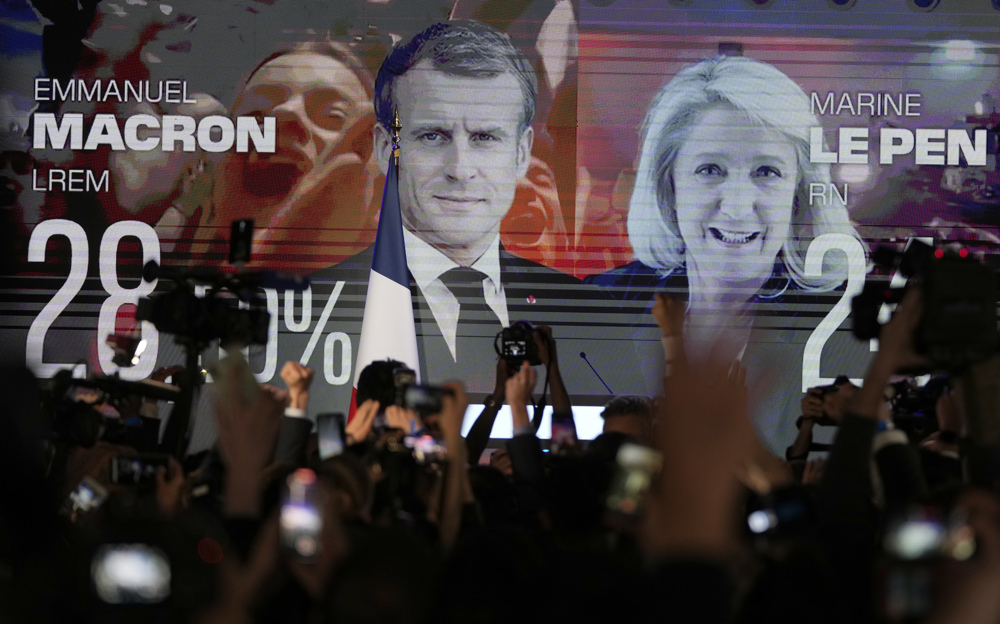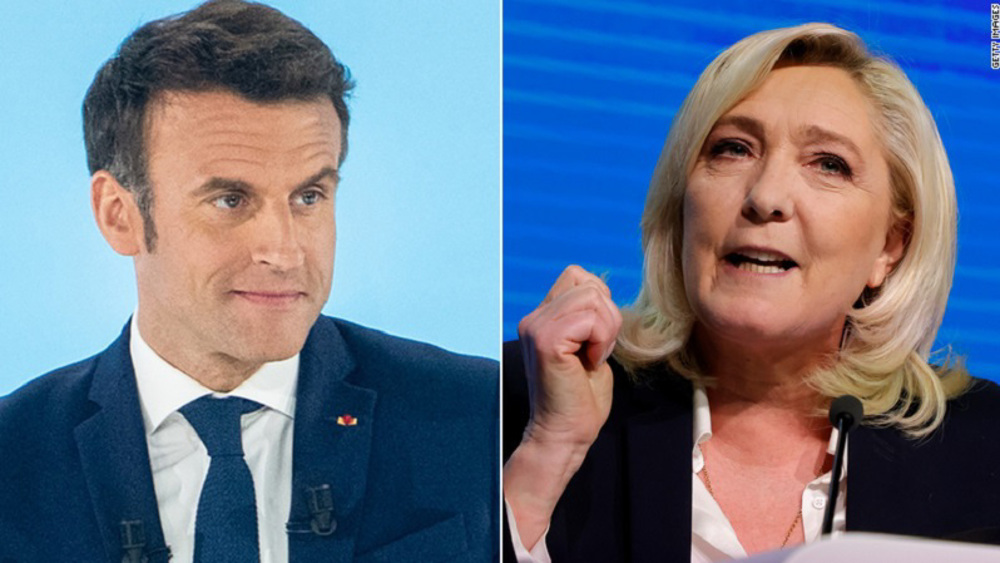Macron, Le Pen suffer setbacks as protesters label run-off ‘fake choice’ between the duo
French President Emmanuel Macron, a self-proclaimed centrist, and far-right presidential candidate Marine Le Pen, who will soon face the incumbent in a run-off, have their own setbacks as the former has no solution for the anti-Muslim woes in France and the latter holds on to her anti-immigration and eurosceptic views.
Political newcomer Macron secured 27.85 percent of the votes on Sunday’s presidential election and her far-right opponent, Le Pen, managed to gather 23.15 percent, making the election virtually a rematch of the 2017 contest since the pair once again will face off in the second round, this time on April 24.
Macron, 44, has promised to continue to lower taxes, and raise the pension age to 65, while Le Pen, 53, has focused on the cost-of-living crisis. Le Pen is also campaigning to ban the Muslim head-scarf from all public places as part of her anti-immigration program.
The incumbent president’s domestic policies are more divisive and less popular, most notably his bloody handling of the ‘Yellow Vest’ movement, one of France’s most prolonged and potent protests in recent history.
The Yellow Vests staged more than 60 consecutive weeks of protests against economic hardship, mounting inequality, and a discredited political establishment. But their protests were met with a fierce crackdown that eventually smothered the movement.
More than three years after it was smothered, its avid supporters, however, are counting on their ballots to finish the job.
Macron’s record on the COVID-19 pandemic is also inconclusive.
Furthermore, his government is under fire for systematically targeting the country’s minority Muslim population with anti-Muslim policies through introducing a series of controversial laws that several human rights groups have censured as Islamophobic – including the anti-separatism law and the Imam Charter.
Le Pen, on the other hand, has repeatedly underscored that stopping what she brands “uncontrolled immigration” and “eradicating Islamist ideologies” are her manifesto’s two priorities. Her critics believe her proposed changes to treaties, dismantling of rules and cuts to budget contributions would eventually lead to France’s exit from the European Union. They say her manifesto is full of lies and false promises that conceal a far-right agenda.
A Le Pen victory would, however, be seen as a victory for right-wing populism and send shock-waves across Europe and markets. Her presidential campaign has been based on the goal of shifting economic power and advantage away from the rich and the elite toward ordinary people. But while her economic program is indeed interventionist and left-wing, her other policies are deemed extreme and nationalist.
On April 13, dozens of students began occupying the building of La Sorbonne University to condemn what they called the “fake choice” between Macron and Le Pen in the run-off.
Although the occupation of Sorbonne ended, the protest movement spread to a number of other universities across France. Other sporadic occupation protests occurred the day after the first round, at the University of Paris 8 and the École Normale Supérieure Jourdan, in the 14th arrondissement of Paris.
On Saturday, protests were also expected around France as opponents of Le Pen try to form a united front to prevent her from winning. Police have already warned of possible incidents as protesters gather in about 30 cities.
Climate change activists, for their own part, forced the closure of a main square in central Paris on Saturday to protest against the environmental programs put forward by both Macron and Le Pen.
Earlier, the Extinction Rebellion (XR) had said it planned to block a major Parisian location to disrupt the electoral cycle and its “business as usual” attitude.
“We are blocking this Paris square to rebel against alternatives that we don’t have. This election leaves us with no choice between a far-right candidate with repugnant ideas ... and a candidate who during five years cast the ecology issue aside and lied,” Lou, 26, a history teacher, who joined the Extinction Rebellion movement two years ago, told Reuters.
The 2022 presidential election in France is unlike any of the previous ones, due in large part to the events that have taken place on the political and social arena in recent years, such as an economic crisis, the COVID pandemic, the Ukraine conflict and the increasing pressure on minorities, including Muslims and immigrants.

France detains Iranian journalist amid crackdown on pro-Palestinian voices

Israel revokes visas for 27 French MPs after Macron signals support for Palestinian state

French journalists stage 'die-in protest' in support of Palestinian reporters
VIDEO | Gaza’s dire conditions hit unprecedented levels
VIDEO | Press TV's news headlines
VIDEO | Pakistan’s business and cultural front unites for Gaza: Nationwide shutdown, boycott announced
US jets carry out more aggression against Yemen
Syrian militants enslaving Alawite women in Idlib governorate: Report
VIDEO | US pro-Palestinian campus protest
VIDEO | Palestinian civil defense rejects Israel’s probe and exposes the crime
India downgrades ties with Pakistan after deadly Kashmir attack










 This makes it easy to access the Press TV website
This makes it easy to access the Press TV website